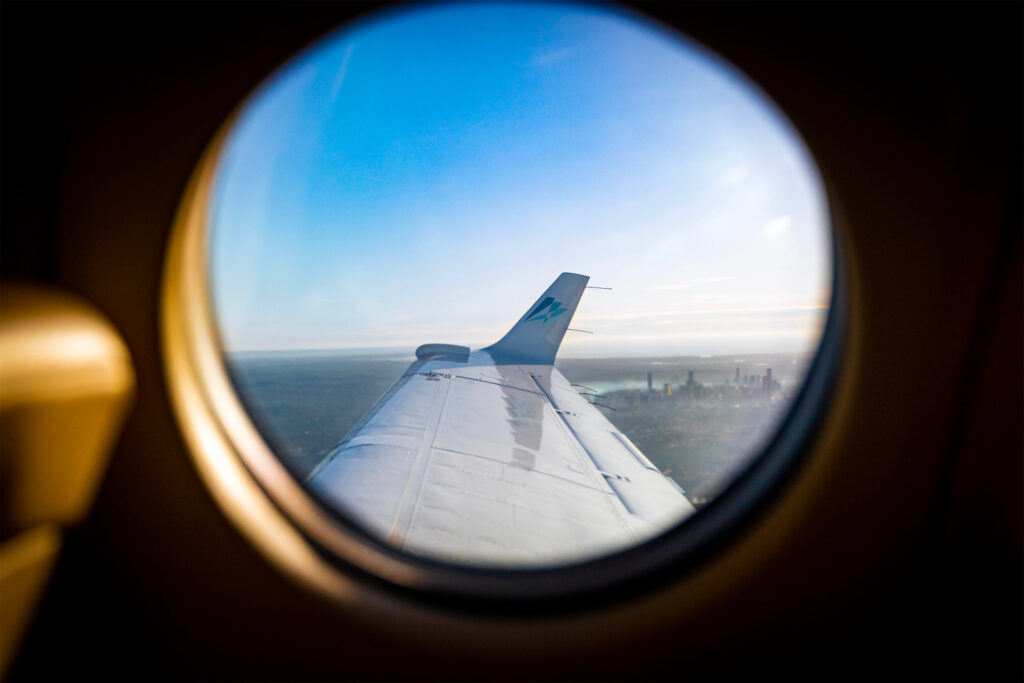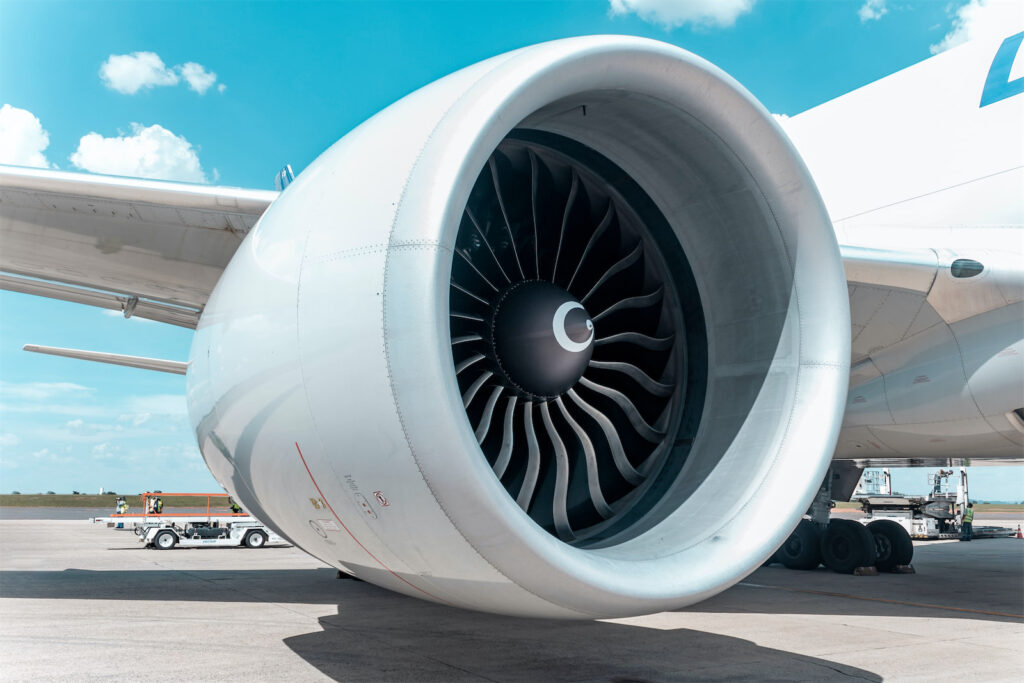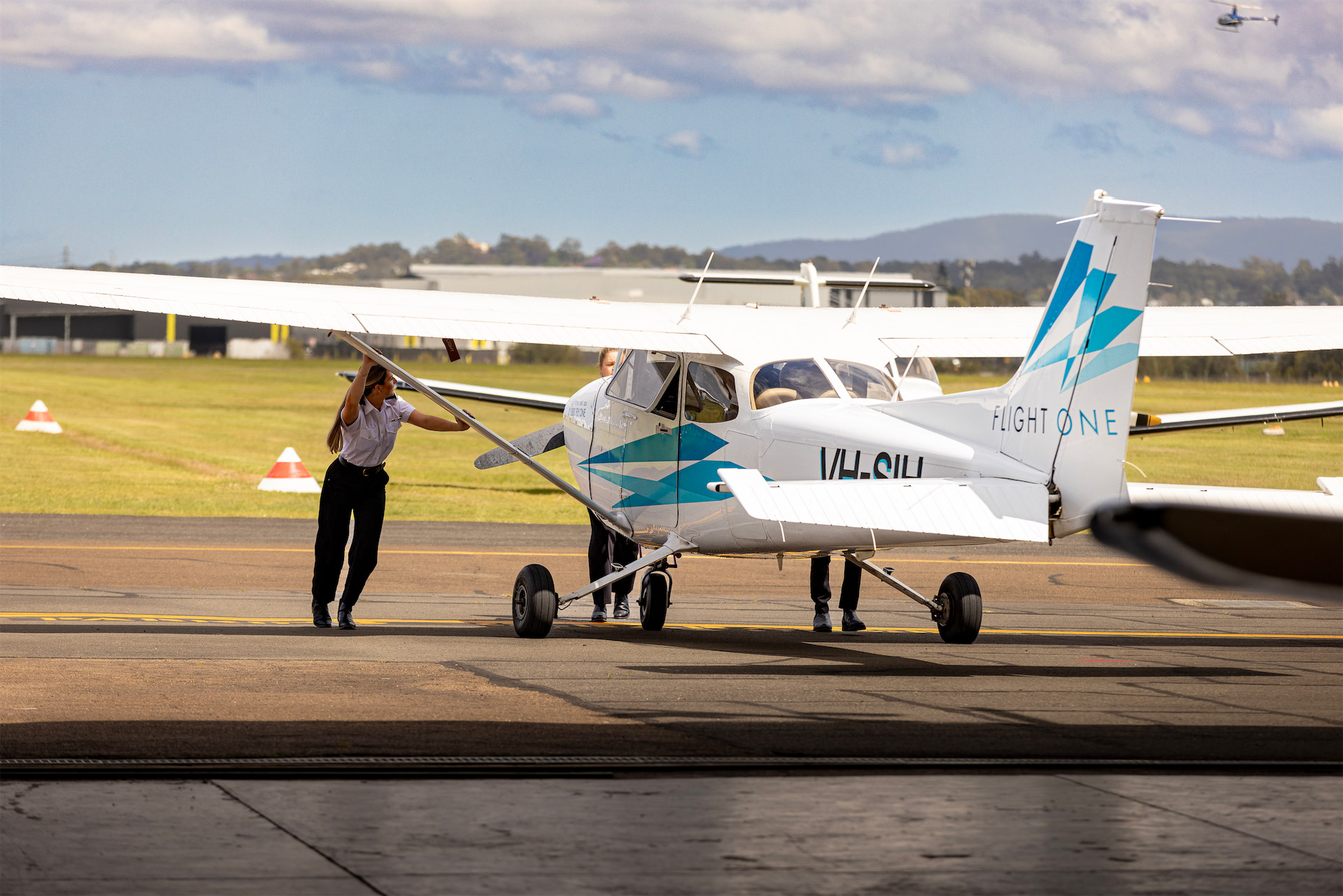Course Details
| Qualification |
AVI50222 Diploma of Aviation (Commercial Pilot Licence – Aeroplane) |
| Training Provider |
Flight One Australia (RTO 31285 | CRICOS 01302M)
trading as Flight One School of Aviation |
| Training Location Options |
Archerfield Airport, Brisbane |
| Duration / Mode |
This course is 13 months in duration with required regular on-campus attendance. Weekly commitment is 20hrs minimum. |
| VET Student Loans |
This course is VET Student Loans approved.
Please view Tuition Fee details and Payment Schedules below. |
| International Students |
This course is approved for international students.
(CRICOS Code 01302M) |
Introduction
Flight One School of Aviation has the privilege of being a CASA certified Flight Training Organisation and a CRICOS and VSL approved Registered Training Organisation (RTO). These combined approvals allow us to deliver theory and practical training and assessments to domestic and international students toward Australian pilot licences through formal Australian Qualifications Framework diplomas and additionally, offer VET Student Loans as a payment option for domestic students.
Training is conducted at Archerfield Airport in Brisbane and Gold Coast Airport at the Gold Coast, by experienced aviation instructors utilising authentic training equipment and well maintained aircraft.
As has been the case for over 40 years, Flight One Australia’s ethos revolves around diligent attention to aviation industry safety and quality standards. Our courses are customer service oriented and our syllabus provides an authentic airline-centric training experience. To achieve the level of proficiency expected of our graduates, pilot trainees are expected to maintain attendance and course progress befitting a professional pilot.
As part of a broader aviation group that includes VIP and business chartering, airport FBO services and CASA approved aircraft maintenance and repair operations, we are able to offer a genuinely industry driven, innovative programmes with integrated theory and practical training to ensure that you are job ready upon graduation. Please visit About Us to learn more about our flight school and the broader Tisdall Aviation Group.
About Commercial Piloting
Commercial pilots carry out the safety critical activity of flight for reward in support of a wide range of clients. The vast array of activities undertaken include charter, aeromedical, passenger transport, photography and survey work.
Commercial pilots learn to utilise sophisticated electrical components of aircraft such as on board computers, radio and GPS / GNSS equipment.
The demand for qualified Pilots is an international trend, and the Commercial Pilot is well placed to pursue career paths in general aviation, regular passenger (airline) transport and specialised operational roles.
Outcomes
Our CPL programme is designed around the concept of licence readiness – providing each graduate with the CASA theory and associated examinations necessary to achieve a licence outcome.
The course includes formal theory training aligned to the knowledge requirements within the Civil Aviation Safety Regulations, and assessments that are delivered under Flight One’s CASA Part 141 Flight Training Organisation Approval Certificate. When combined with our extensive practical training, this structure empowers our graduates and prepares them to seize career opportunities as they arise.
To be eligible to apply for a CASA Pilot Licence, graduates must also meet CASA’s stipulated requirements including exams and flight tests conducted by CASA appointed testing officers.
The expected outcomes of this course, subject to demonstrated competencies and other CASA requirements, are:
- Recreational Pilot Licence
- Private Pilot Licence
- Commercial Pilot Licence
- Diploma of Aviation (Commercial Pilot Licence – Aeroplane)
- Training & Assessment Arrangements
Training is conducted online and at Archerfield Airport in Brisbane, Australia, via face to face classroom training by experienced flight instructors utilising an extensive training fleet and simulators.
Assessments for this programme are conducted and invigilated in accordance with the requirements of the Civil Aviation Safety Authority (CASA) and the Australian Skills Quality Authority (ASQA). Assessments may include, but are not limited to, multiple choice, short answer, short essays, group work under observation and practical aviation assessments (flight tests).
Recognition For Prior Learning (RPL)
Applicants with well documented previous training and/or experience may be eligible for Recognition for Prior Learning toward Units of Competency included in this qualification. Please advise at the time of application if you are seeking RPL.
Delivery Mode
To achieve a higher level of flexibility for our trainees, this course is mixed mode and is delivered through a combination of:
- self-guided study of the theoretical principles that underpin aeroplane flight and the Commercial Pilot Licence using online training resources
- instructor-lead briefings one-on-one, or in small groups, to reinforce, check and approve theory knowledge
- self guided and instructor-lead flight planning
- instructor-lead flying lessons to achieve practical competencies
- flight tests and theory exams carried out by the Civil Aviation Safety Authority
Flight lessons will be scheduled at a sufficient pace to remain within the study periods and must be attended once booked. Fast tracking is permitted but must be approved by the Chief Flight Instructor and the Head of School and are dependent upon trainee aptitude and progress as well as availability of resources and instructors.
Students undertaking this course are expected to wear the college uniform provided.
Syllabus Overview
The Commercial Pilot Licence course syllabus is made up of 9 phases, each covering specific piloting skills and theoretical principles. The first three phases, RPL1, 2 and 3 cover the Recreational Pilot Licence and the fourth phase, PPL1 finalises the Private Pilot licence.
A PPL exam and flight test will be administered so trainees are eligible to gain their Australian Private Pilot Licence. The following five phases, CPL1 – 5, step through the advanced training required for the Commercial Pilot Licence. The following five phases, CPL1 – 5, step through the advanced training required for the Australian Commercial Pilot Licence.
- RPL1 – Recreational Pilot Licence Phase 1
- RPL2 – Recreational Pilot Licence Phase 2
- RPL3 – Recreational Pilot Licence Phase 3
- PPL1 – Private Pilot Licence Phase 1
- CPL1 – Commercial Pilot Licence Phase 1
- CPL2 – Commercial Pilot Licence Phase 2
- CPL3 – Commercial Pilot Licence Phase 3
- CPL4 – Commercial Pilot Licence Phase 4
- CPL5 – Commercial Pilot Licence Phase 5
There are seven key theory subjects within the CPL, each with a corresponding exam administered and regulated by the Civil Aviation Safety Authority (CASA). The theory subjects covered in the course, and their CASA exam codes are:
- CPL Human Factors (CHUF)
- CPL Aircraft General Knowledge (CSYA)
- CPL Aeroplane Aerodynamics (CADA)
- CPL Meteorology (CMET)
- CPL Navigation (CNAV)
- CPL Operation, Performance and Flight Planning (CFPA)
- CPL Flight Rules & Air Law (CLWA)
In the formal Diploma course, trainees undertake their theory training for the seven CPL subjects through the context of the Diploma of Aviation’s vocational Units of Competency. Each phase commences the knowledge building for a set of units of competency and at the conclusion of the course, successfully gaining the CPL confirms the practical competencies for each unit. This results in a dual award arrangement whereby trainees will receive certification from the Civil Aviation Safety Authority (CASA) for the seven CASA subjects (and licences) and additionally, a Statement of Attainment for the Australian Skills Quality Authority (ASQA) nationally recognised vocational Units of Competency.
General Entry Criteria
The following criteria apply to both domestic and international students. To receive approval to enrol in this qualification, applicants must:
- be at least 18 years old at the planned commencement date; and
- have completed Australian senior high school or equivalent; or
- successfully pass the prescribed Language, Literacy and Numeracy test; and
- have a native or advanced level of English.
Flight School Entry Criteria
To receive approval to undertake flight training, applicants must also:
- successfully pass the Symbiotic ADAPT pilot aptitude test; and
- successfully pass a discussion style interview.
Civil Aviation Safety Authority (CASA) Criteria
To receive approval to undertake flight training for this course, applicants must:
Note: An ARN is a simple process that involves corresponding with CASA and obtaining a unique CASA identifier. Please refer to the Aviation Reference Number (ARN) section on CASA’s website for instructions.
- be eligible to obtain a CASA Class 1 Aviation Medical Certificate; and
Note: You are expected to present a valid Class 1 medical certificate at commencement of your course unless authorised in writing by the RTO; we reserve the right to delay commencement if you are not able to present certification at commencement. This medical certification suitable to your level of training must remain valid for the duration of the course and is the responsibility of the student to maintain.
Details and further information are available from CASA – https://www.casa.gov.au/licences-and-certificates/aviation-medicals/medical-certificates.
- be eligible to obtain an Australian Aviation Security Identity Card (ASIC); and
Note: Obtaining an ASIC requires police clearance by way of a background criminal check that can include:
-
- National police check
- Australian Criminal Intelligence Commission criminal assessment
- Australian Security Intelligence Organisation national security assessment
- Department of Home Affairs Visa Entitlement Verification Online (VEVO) system check
If you have significant criminal history, you may not be eligible to hold an ASIC.
ASIC applications require support for operational needs. This is provided to you by us after your successful enrolment along with instructions for lodging an ASIC application.
- have sufficient English language ability to pass the CASA Aviation English Language Proficiency (AELP) assessment; and
Note: CASA has requirements for the minimum standards of English language. Trainees will undergo testing to gain CASA certification (at a minimum of level 4) of their aviation English standard during the early stages of the course.
- Have aeronautical knowledge and experience evidenced by CASA documentation and/or licencing for the proposed training stage, if relevant.
Note: to enrol directly into the Diploma of Aviation – Instrument Rating, or Flight Instructor qualifications, it is a requirement to hold a current Australian Commercial pilot Licence and Class 1 Aviation Medical Certificate.
Additional Entry Criteria for VET Student Loans
Domestic students planning to access a loan via the Australian Government VET Student Loan scheme must:
- provide evidence of meeting the VSL citizenship eligibility criteria; and
- provide an Australian senior high school graduation certificate and academic results; or
- pass the prescribed Language, Literacy and Numeracy test.
There are specific criteria for use of the VET Student Loans scheme. Please visit our VSL Page for further details.
Additional Entry Criteria for International Students
International students must be able to provide evidence that they have:
- a valid passport; and
- no criminal record; and
- no prior visa refusals; and
- sufficient funding for the full course fee, cost of living and flights to and from Australia.
To prove that they have suitable English language proficiency, international students must be able to provide evidence that they have:
- a valid passport issued by the United Kingdom, the United States of America, Canada, New Zealand or the Republic of Ireland; or
- obtained within the last year, one of the following English language test results:
- IELTS (academic) certificate with a minimum score of 6.5 / no band score below 6.0; or
- Pearson PTE certificate with a minimum score of 58 / no band score below 52
The RTO reserves the right to make reasonable adjustments where sufficient grounds exist.
Domestic Student Tuition Fees
- Full Tuition Fee for this qualification: $106,310
- Tuition fees are payable in instalments
- This course is approved for VET Student Loans
- Additional (Non-Tuition) Fees apply. Details below.
- All amounts are in Australian Dollars
VET Student Loans (VSL)
This course is approved for the Commonwealth Government VET Student Loan scheme with no out of pocket “gap” fee to pay upfront.
- Total Gap Fee for this qualification you will need to pay: $15,813
- Total Tuition Fee (Maximum Loan Cover) for this qualification: $106,310
- VSL Indexed Loan Cap for this qualification: $90,497
All amounts are in Australian Dollars. VET Student Loan availability is subject to eligibility requirements and creates a debt that must be repaid to the Commonwealth. Please see the VSL Tuition Fee Schedules below and visit our VSL Information Page for guidance and instructions if you are planning to use VET Student Loans to assist with the payment of your tuition fees. You can also view the relevant policies on our Policies & Procedures page. VSL payment schedules for each intake are published prior to commencement and can be viewed below. Some expenses can not be covered by a VET Student Loan. Details below.
Payment Schedule for Gap Fee
The Gap Fee will be apportioned across six fee periods. The fee periods will contain at least one census date and are as follows:
$3,000 due prior to the census day for CPLIFT1 (2 weeks after commencement)
$3,000 due prior to the census day for CPLIFT2
$3,000 due prior to the census day for CPLIFT3
$3,000 due prior to the census day for CPLIFT4
$3,813 due prior to CPL flight test
Domestic Student Tuition Fees – Self Funded
If you do not wish to, or are not eligible to use VSL to pay your tuition fees, you are welcome to pay the Full Tuition Fee for this qualification directly (self-funding) on an instalment schedule. You can also mix the use of VET Student Loans and self funded payments.
VET Student Loans Tuition Fee Schedules
Archerfield Fee Schedules
Gold Coast Fee Schedules
International Tuition Fees – AVI50222 – Diploma of Aviation (CPL)
- Full Indicative Tuition Fee for this qualification: $120,000
- Tuition fees payable in instalments as below
- Additional (Non-Tuition) Fees apply as below
- All amounts are in Australian Dollars
Note: There are currently no loan or scholarship offers for this programme.
International Student Fee Schedule
This fee schedule is indicative and is provided for guidance purposes only. The exact schedule that pertains to your course and intake will be provided by way of a formal Letter of Offer for your consideration. It is essential that you have sufficient funds to meet the instalment schedule plus reserve funds should the need arise for you to take repeat or additional lessons or exams.
DUE
|
AMOUNT (AUD)
|
| DEPOSIT |
$20,000.00 |
| MONTH 01 |
$20,000.00 |
| MONTH 03 |
$20,000.00 |
| MONTH 05 |
$20,000.00 |
| MONTH 07 |
$20,000.00 |
| MONTH 09 |
$20,000.00 |
| TOTAL |
$120,000.00 |
Note: Non-tuition costs are separate and are detailed below.
Additional (Non-Tuition) and Other Fees
There are costs associated with this qualification that are not included in the tuition fees (and therefore, in accordance with ASQA regulations, are not eligible for VET Student Loans cover). It is important to be financially prepared for these costs to reduce the likelihood of disruptions to your training. Costs not covered by the tuition fee may include:
- Material Fee ($2,000 approx):
Material fees cover various training materials required throughout the course. Payment of material fees is mandatory and can only be adjusted with permission from a senior Flight Instructor. Enrolment is not confirmed until the material fee payment due at acceptance has been paid. Material costs MAY CHANGE and various items may need to be added, replaced and/or updated as you move through the course. We provide as much guidance as practicable in relation to non-tuition fees but ultimately it is the trainees responsibility to ensure that all stipulated materials and equipment are acquired and available for training in a timely manner. This fee includes items such as:
-
- Pilot Briefcase and stationery
- Branded pilot uniform shirts
- Textbooks, flight documents and charts
- Tools and equipment required for flight planning and navigation
- Third party pilot aptitude placement assessment
The material fee is apportioned across two payments and payable as follows:
-
- $1,500 four weeks prior to commencement of the course
- $1,500 on commencement when you will receive the balance of your course materials
- Pilot Headset: As soon as practicable, pilot trainees will need to purchase, from their preferred supplier, a pilot headset of their choice, preferably in the range of $600 (good quality) to $1,650 (premium quality). Our instructors will assist you to determine the most suitable headset to meet your needs and budget.
- Aviation Medical Examinations: Students commencing this qualification are required to undertake medical examinations specified and regulated by the Australian Civil Aviation Authority (CASA). Medical examinations are arranged by the student at the student’s expense. Students are encouraged to finalise and hold their Class 1 medical documentation from CASA by commencement day. CASA has approved a network of medical examiners throughout Australia and the world so in most cases a medical examiner should be international students will also are Students who have not received their medical will be asked to move to the next intake. Further information will be provided in the formal Letter of Offer. We also recommend that you consult CASA’s website here: www.casa.gov.au/licences-and-certificates/aviation-medicals/medical-certificates/classes-medical-certificate. CASA Designated Aviation Medical Examiners can be located here: www.casa.gov.au/content-search/medical-and-eye-examiners. Medical examination and associated fees are not included in the tuition fees.
- Aviation Security ID Card (ASIC): All students will be required to successfully apply for an ASIC costing approximately $340. This is done through a third party and assistance will be provided during the onboarding stage prior to commencement.
- Remedial Activities: This includes briefings, flights, and other training events that you need to participate in because you have not met the required standard of competency.
- Remedial Flights: Flight lessons that need to be repeated as a result of a competency not being achieved are called Remedial Flights. Trainees should expect that from time to time, remedial flights may be necessary, or may wish to voluntarily repeat a flight. Fees associated with remedial flights will need to be paid at the time of booking. The cost of remedial flights depend on the nature and length of the repeated lesson and can range from $480 to over $2,000 each. It is therefore essential that trainees have some savings or credit set aside for remedial flights to avoid the possibility of training being suspended.
- Exams: Additional or repeated exams are not included in the tuition fees.
- Flight Training Cancellation Fee: Cancellations made within 24 hours of the scheduled session leave either an aircraft, an instructor, or both subsequently idle. This results in a delay to your own training and disadvantages our other clients who may have usefully utilised that instructor’s/aircraft’s availability. Should you have to cancel a Briefing, Flight or Simulator session please do so with no less than 24 hours notice prior to the session, otherwise a Cancellation Fee may be charged. The cancellation fee is currently $132.
- Options / Upgrades: Pilot trainees who request additional optional flights, extended flights and/or aircraft upgrades will incur additional fees that are not included in the tuition fees.





